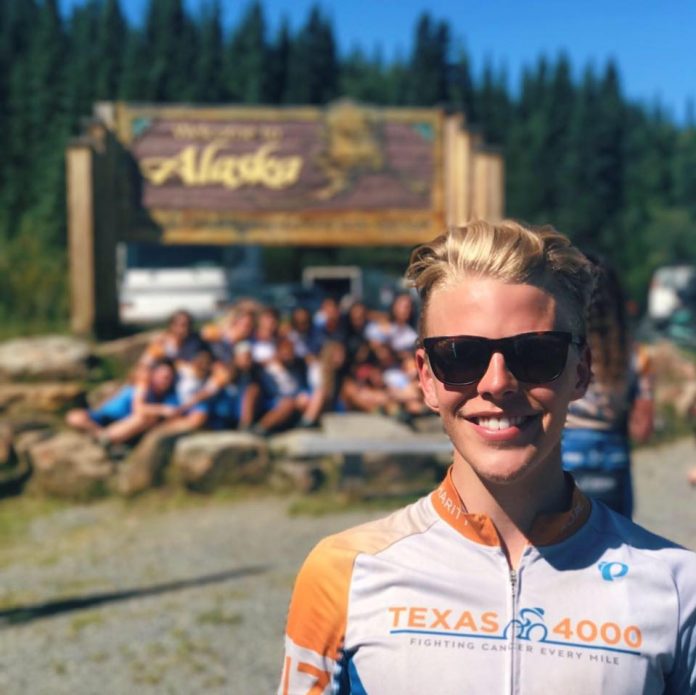
Keeton Charles Schenck had never clipped into a road bicycle until his freshman year of college.
About 15 months later, he embarked on a 4,500-mile bicycle trip from Austin to Anchorage, Alaska.
Schenck was born and raised in Flower Mound, where much of his extended family lives, including his grandmother, Linda Goff. She and several other family members had had their fights with cancer.
Goff had battled breast cancer, but she had been in remission for over a decade when she was re-diagnosed a few years ago, during Schenck’s senior year at Flower Mound High School.
“That was the impetus for me getting involved, and joining her in that fight,” said Schenck.
The next year, as a freshman at the University of Texas, Schenck got involved with Texas 4000, an 18-month leadership development program that engages communities in the fight against cancer.
Its cornerstone event is a 4,000-plus bike ride from Austin to Anchorage. Three groups take different routes through the country and meet in Canada for the last leg of the trip.
Riders train for about 15 months, Schenck said, raising money for cancer research before, during and after the trip. As of this week, all the riders together had raised about $737,000 for the MD Anderson Cancer Research Center in Houston and UT Biomedical Research Center grants.
Schenck left Austin with 24 other riders early this summer and headed northwest through West Texas, the Panhandle and New Mexico, west through the Four Corners area, Nevada and California, and then north up the west coast and through Canada to the Alaska border, and west to Anchorage. It was a 70-day, 4,500 mile journey through some of the driest, most mountainous and most remote areas of North America.
They saw some national parks, including Crater Lake, Redwood and Zion. They navigated around large wildfires in British Columbia. They either camped or slept on the floors of churches or fire stations, and occasionally with host families along the way. Some days, they didn’t see anyone, or any stores, leaving them with just water and protein bars for energy.
Their first three weeks were mostly in the desert, and one of the toughest days of the trip was near Death Valley, Schenck said.
“I could never cool off,” Schenck said. “There was no shade, all our water in our water bottles was hot and everything was dusty.”
The trip was physically exhausting, of course. Schenck said he lost 10 pounds. But there was a mental aspect of the trip that was more tiring than riding 90 miles a day.
“I was incredibly intimidated about navigating highways on the shoulder,” he said. “My concern was realized every single day, as I was biking on narrow shoulders covered in trash while being closely passed by semi-trucks going 70 mph.
“I never got used to that. The mental strain of feeling like you’re risking your life every day was the most taxing part.”
For most of the time, the riders didn’t have cellphone service.
“It was really relaxing to disconnect,” Schenck said. “It made the experience a lot more special.”
All along the trip, even in some of he most remote areas, local people seemed to flock to the group of riders, and many of them had stories to tell about how cancer has impacted their lives or the lives of their loved ones.
“All of those stories, I carried them to Alaska,” Schenck said.
Late in the trip, the riders stopped in the town of White Horse in the Yukon territory in Canada and were approached by a supporter.
“He came up and said that what we were doing inspired such hope for the many people concerned about this disease,” Schenck said. “That was a really special experience.”
Schenck said the trip taught him to appreciate cycling, the continent’s natural beauty and how cancer has impacted people’s lives, but his No. 1 takeaway was about simply interacting with other people.
“Outside of divisive, partisan topics, within America and Canada, there is so much love in every community, if you give them the chance to speak about that,” he said. “We may not agree in another context, but they opened up their home to me or had another level of human connection and bonding experience.”
Schenck and Texas 4000 are still raising funds for cancer research through the end of October. Click here to donate and to learn more about him and the organization.



















